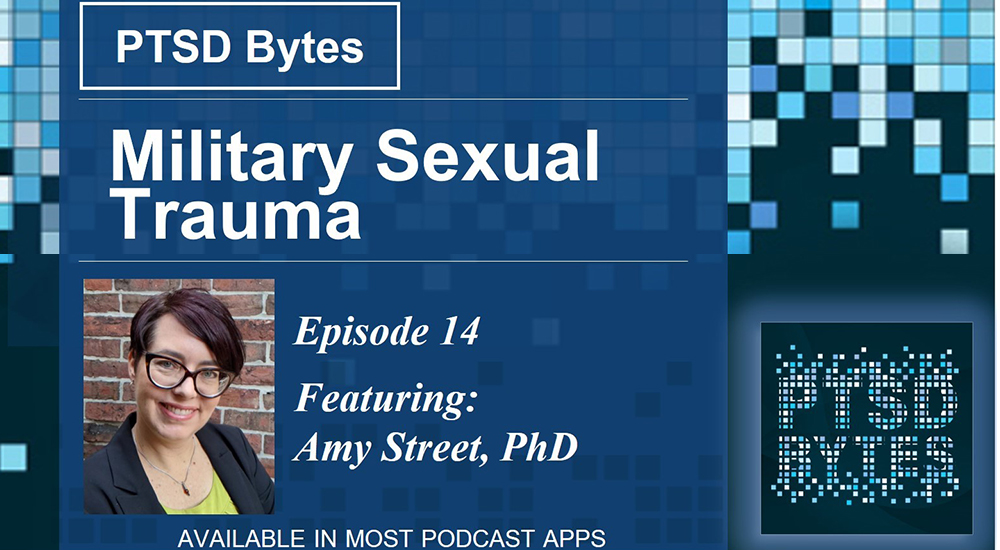Listen to “#14: Military Sexual Trauma (MST)” on Spreaker.
In this episode of PTSD Bytes, host Pearl McGee-Vincent discusses military sexual trauma with Dr. Amy Street, the deputy director of the National Center for PTSD Women’s Health Science Division at Boston VA.
What is military sexual trauma (MST)?
Military sexual trauma (MST) is any unwanted sexual experience that happened during military service. It can include sexual harassment or sexual assault. MST can happen to anybody, any gender, in any branch of the military.
MST recovery and professional help
Street wants survivors to know that MST is never their fault and that VA is here to help them in their recovery. Many survivors continue to struggle with MST-related distress or other mental health symptoms. Since people’s experiences with MST are not the same, neither is their treatment. Part of the treatment for MST can include treatment for post-traumatic stress disorder, a common issue connected to MST.
All VA treatment for physical and mental health issues related to MST is free, even if the MST was never reported. All VA health care systems have a coordinator who can help survivors access MST services. Call your local VA healthvcare facility and ask to speak with the MST coordinator if you want to learn more.
 MST recovery and the mobile app, Beyond MST
MST recovery and the mobile app, Beyond MST
The Beyond MST mobile app was created to help MST survivors, regardless of age, gender, military branch, or stage of recovery. It is a free app that can be downloaded on your smart phone or tablet. There are more than 33 tools to help teach, build and practice different skills. There is also a progress section to track symptoms and goals.
Some of the focuses of the app are countering self-blame, strengthening relationships skills and talking about the experience. The finding hope section of the app helps survivors fight hopelessness and isolation. The Beyond MST app can also help survivors to figure out if professional help is the right choice for them.
The Beyond MST app includes many privacy features, so no one from VA will know who is using it. The app does not collect any personal health information, and any information entered into the app cannot be accessed by VA or any third parties.
You do not have to be a Veteran to use the app. Anybody can use it, including loved ones and health care providers.
Intro to Beyond MST video: https://youtu.be/3MPdGA_XWAI.
Additional links:
If you are a Veteran who is experiencing a crisis or supporting a loved one who is, call 1-800-273-8255 and press 1 for immediate assistance, or chat online at VeteransCrisisLine.net/chat.
Topics in this story
Link Disclaimer
This page includes links to other websites outside our control and jurisdiction. VA is not responsible for the privacy practices or the content of non-VA Web sites. We encourage you to review the privacy policy or terms and conditions of those sites to fully understand what information is collected and how it is used.
More Stories
Take the Five Days to be Healthier Together challenge to be stronger and healthier.
VA is putting Veterans in the driver's seat for making medical appointments.
Larry Trujillo lost 44 pounds and improved his relationship with food during the 90-day TeleMOVE! telehealth program.







I feel for you Robert.
Mine occurred in 1969
Perhaps if the military went after those that did me…yours may have been prevented. Of course, that didn’t happen and I have been semi living with the trauma ever since.
I have tried getting help for MST for reoughly 45 yrs and just pushed aside. The VA doesn’t help with it. They just push you aside. Especially a Male who was Sexually Assaulted and didn’t ask for it. It happened at a time where everybody was coming out of the closet and I didn’t ask for it. It happened at age 18(1978).